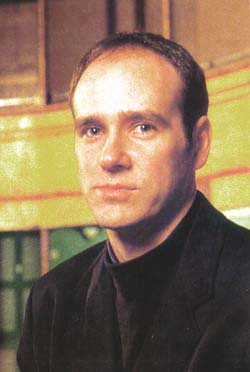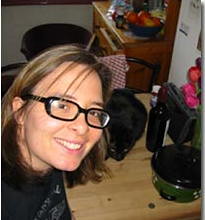Redell Olsen & Drew Milne gave a smashing reading at Slought on Tuesday evening. It was a short event – maybe 45 minutes total for the two readers combined – followed by a brief & very informal Q&A session led by Bob Perelman. It was a great blast of fresh air, getting to see & hear two poets, both quite different from one another, fully engaged in a poetics that was (a) global in its ambition & scope (what I mean by that I will get to in a minute) and (b) utterly content to be understood as intellectuals & critical thinkers. None of the “Aw Shucks” b.s. one gets from so many American writers when pushed on the question do poets think?
It’s been a decade since the Scottish-born Milne co-edited a volume with Terry Eagleton called Marxist Literary Theory: A Reader. He’s subsequently published a volume on critical thought and has another volume on Marxist literary theory as well as a volume of conversations with Eagleton in the works. He edits Parataxis.
Olsen jokes that she was born in “the wrong
Both poets seem to be participants in a post-national post-avant scene in which English is the currency, but where the meaning of that term is something quite different from it would appear to be, say, in the hands of Larkin or a Heaney, or, for that matter, an Olson or a Ginsberg. How2, for example, may have been started by poets for the most part in the San Francisco Bay Area, but she does her work as managing editor from her post at the
It’s one that Olsen addresses directly in her “Minimaus Poems,” a series that works off her name-sake – that Olson with an “o” – and the curiously double fact for each of them of
Off-shore, by islands hidden in the blood
jewels & miracles, I, Maximus
a metal hot from boiling water, tell you
what is a lance, who obeys the figures of
the present dance
Here, in contrast, are the first lines of Olsen’s first lines of “I, Minimaus of Gloucester, to You”:
Inland, by
jewels & discounts, I, Minimaus
sitting on hot metal, boiling in a vest,
ask you who speeds obediently
are we past ENTRANCE?
Reading Olsen’s passage, it is useful to recognize Iceland as the British retailer specializing in frozen foods & kitchen appliances. Olsen’s piece is both a reading of, and a reading through, that other Olson, some wryly satiric, as above, much of it quite brilliant. It is not, repeat not, that classic student exercise of imitation, but rather a meditation on the roles of influence, not simply of the Projectivists on subsequent post-avant poetry, particularly in the U.K., but of brands altogether & branding, the replacement of Maximus of Tyre by Minnie Mouse, alternately of Orlando & Anaheim, which is how anyone not at the center, wherever that might have migrated, could claim, as does Olsen,
even the trees are bigger
in
Each, it is worth noting, are dealing with the question of how best respond to those “who advertise you / out,” but, for Olsen, the problem of Olson is a recursive one – he might identify the problem, but cannot quite ever become apart from it.
While Olsen read only the first of this sequence during the event at Slought, the questions beneath it reverberated not just through the remainder of the event, and beyond. I’d wished she’d read more & longer, Milne also. It is not just that one loses a minute or two at the head of any reading in which there is a notable (read: difficult) accent – think of how often the first speech or two in any Shakespeare play is a “toss off,” there really just so that the audience can adjust to listening at that distance, and to that rhetorical form. That adjustment alone meant that each poet had, at most, 17 or 18 minutes to get across functionally the whole of a life’s work.
Bruce Andrews used to joke that you could always tell a poet from







